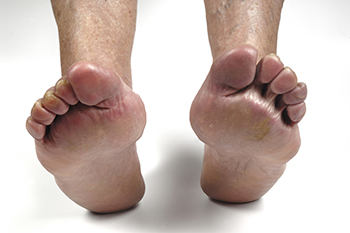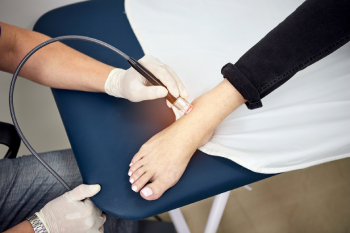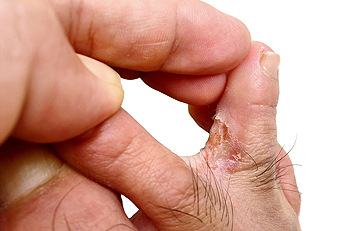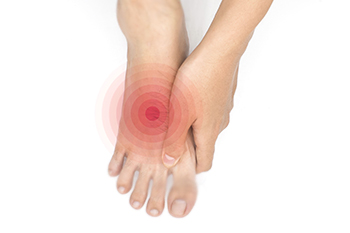Connect With Us
Blog
Items filtered by date: August 2024
Rheumatoid Arthritis and the Feet

Rheumatoid arthritis, or RA, is a chronic autoimmune disorder where the body's immune system mistakenly attacks the joints, leading to inflammation, pain, and swelling. RA commonly affects the feet, with more than 90 percent of those with the condition experiencing foot or ankle involvement. The disease can lead to joint deformities, reduced mobility, and significant discomfort in the feet, impacting a person’s ability to walk and perform daily activities. The burden of RA on the feet can be substantial, leading to difficulties in finding comfortable footwear, increased risk of foot ulcers, and a reduced quality of life. Treatment focuses on managing inflammation and pain, often through a combination of medications, targeted exercises, and lifestyle changes. Orthotic devices or specially designed shoes may be used to alleviate pressure on affected joints. Early diagnosis and treatment can slow the progression of RA and preserve foot function, helping patients maintain an active, pain-free life. If you suffer from the effects of rheumatoid arthritis on your feet or ankles, it is suggested that you are under the care of a podiatrist.
Because RA affects more than just your joints, including the joints in your feet and ankles, it is important to seek early diagnosis from your podiatrist if you feel like the pain in your feet might be caused by RA. For more information, contact Dr. David Ungar of Personal Foot Care. Our doctor will assist you with all of your podiatric concerns.
What Is Rheumatoid Arthritis?
Rheumatoid Arthritis (RA) is an autoimmune disorder in which the body’s own immune system attacks the membranes surrounding the joints. Inflammation of the lining and eventually the destruction of the joint’s cartilage and bone occur, causing severe pain and immobility.
Rheumatoid Arthritis of the Feet
Although RA usually attacks multiple bones and joints throughout the entire body, almost 90 percent of cases result in pain in the foot or ankle area.
Symptoms
- Swelling and pain in the feet
- Stiffness in the feet
- Pain on the ball or sole of feet
- Joint shift and deformation
Diagnosis
Quick diagnosis of RA in the feet is important so that the podiatrist can treat the area effectively. Your doctor will ask you about your medical history, occupation, and lifestyle to determine the origin of the condition. Rheumatoid Factor tests help to determine if someone is affected by the disease.
If you have any questions please feel free to contact our office located in Farmington, MI . We offer the newest diagnostic and treatment technologies for all your foot and ankle needs.
Laser Therapy for Diabetic Neuropathy

Laser therapy is emerging as a promising treatment for diabetic neuropathy, a condition caused by nerve damage that can lead to pain, tingling, and numbness, especially in the feet. Laser therapy involves using light to stimulate the damaged nerve cells, which promotes regeneration and potentially alleviates symptoms. Some studies have shown positive results, particularly with deep-tissue laser therapy. However, there remains debate over its overall effectiveness due to variations in research methods and laser types. Deep-tissue lasers, with their ability to penetrate further into the body, have been noted for their potential in reducing pain for diabetic neuropathy patients. However, more extensive research is needed to establish definitive guidelines for laser therapy's application in neuropathy. A podiatrist can evaluate individual cases and recommend the most suitable laser treatment options. They can also guide patients on the number of sessions required and discuss cost considerations, which can vary based on treatment specifics. If you have foot problems caused by diabetic neuropathy, it is suggested that you schedule an appointment with a podiatrist to find out if laser therapy is right for you.
Neuropathy
Neuropathy can be a potentially serious condition, especially if it is left undiagnosed. If you have any concerns that you may be experiencing nerve loss in your feet, consult with Dr. David Ungar from Personal Foot Care. Our doctor will assess your condition and provide you with quality foot and ankle treatment for neuropathy.
What Is Neuropathy?
Neuropathy is a condition that leads to damage to the nerves in the body. Peripheral neuropathy, or neuropathy that affects your peripheral nervous system, usually occurs in the feet. Neuropathy can be triggered by a number of different causes. Such causes include diabetes, infections, cancers, disorders, and toxic substances.
Symptoms of Neuropathy Include:
- Numbness
- Sensation loss
- Prickling and tingling sensations
- Throbbing, freezing, burning pains
- Muscle weakness
Those with diabetes are at serious risk due to being unable to feel an ulcer on their feet. Diabetics usually also suffer from poor blood circulation. This can lead to the wound not healing, infections occurring, and the limb may have to be amputated.
Treatment
To treat neuropathy in the foot, podiatrists will first diagnose the cause of the neuropathy. Figuring out the underlying cause of the neuropathy will allow the podiatrist to prescribe the best treatment, whether it be caused by diabetes, toxic substance exposure, infection, etc. If the nerve has not died, then it’s possible that sensation may be able to return to the foot.
Pain medication may be issued for pain. Electrical nerve stimulation can be used to stimulate nerves. If the neuropathy is caused from pressure on the nerves, then surgery may be necessary.
If you have any questions, please feel free to contact our office located in Farmington, MI . We offer the newest diagnostic and treatment technologies for all your foot care needs.
Causes and Symptoms of Athlete’s Foot

Athlete's foot is a fungal infection that primarily affects the feet. The fungi thrive in warm, moist environments, such as pools, locker rooms, and gyms. Although anyone can get athlete's foot, it is more prevalent in men. The fungi causing this infection live on the surface of the skin, particularly in sweat-prone areas, like between the toes. Symptoms of athlete's foot include dry skin, itching, and burning sensations, especially between the toes, along with red, scaly rashes. Blisters may form, which can peel or crack open, leading to exposed, raw tissue. Inflammation and a foul odor are also common signs. The infection spreads through direct contact with contaminated surfaces or skin and is more likely in people who wear closed shoes or sweat a lot. If you have a troublesome athlete's foot infection, it is suggested that you schedule an appointment with a podiatrist for advanced treatment.
Athlete’s foot is an inconvenient condition that can be easily reduced with the proper treatment. If you have any concerns about your feet and ankles, contact Dr. David Ungar from Personal Foot Care. Our doctor will treat your foot and ankle needs.
Athlete’s Foot: The Sole Story
Athlete's foot, also known as tinea pedis, can be an extremely contagious foot infection. It is commonly contracted in public changing areas and bathrooms, dormitory style living quarters, around locker rooms and public swimming pools, or anywhere your feet often come into contact with other people.
Solutions to Combat Athlete’s Foot
- Hydrate your feet by using lotion
- Exfoliate
- Buff off nails
- Use of anti-fungal products
- Examine your feet and visit your doctor if any suspicious blisters or cuts develop
Athlete’s foot can cause many irritating symptoms such as dry and flaking skin, itching, and redness. Some more severe symptoms can include bleeding and cracked skin, intense itching and burning, and even pain when walking. In the worst cases, Athlete’s foot can cause blistering as well. Speak to your podiatrist for a better understanding of the different causes of Athlete’s foot, as well as help in determining which treatment options are best for you.
If you have any questions please feel free to contact our office located in Farmington, MI . We offer the newest diagnostic and treatment technologies for all your foot and ankle needs.
Gout Pain Can Be Managed
Signs of Diabetic Foot Damage

Diabetes can lead to serious complications, including damage to the feet. One common sign is persistent pain, often described as sharp or tingling, which may indicate nerve damage, also known as neuropathy. Another symptom is a burning sensation, particularly in the feet, which can worsen at night. Swelling is also a concern, as it may signal poor circulation or fluid retention, both common in diabetic patients. Changes in skin color, ranging from pale to red or blue, can indicate reduced blood flow or infection. These signs should not be ignored, as diabetic foot damage can lead to ulcers, infections, and in severe cases, amputation. Regular foot inspections, maintaining healthy blood sugar levels, wearing proper footwear, and seeking immediate medical attention for any concerning symptoms are vital steps in managing and preventing diabetic foot complications. If you have diabetes, it is suggested that you are under the care of a podiatrist who can help you to manage this condition.
Diabetic foot care is important in preventing foot ailments such as ulcers. If you are suffering from diabetes or have any other concerns about your feet, contact Dr. David Ungar from Personal Foot Care. Our doctor can provide the care you need to keep you pain-free and on your feet.
Diabetic Foot Care
Diabetes affects millions of people every year. The condition can damage blood vessels in many parts of the body, especially the feet. Because of this, taking care of your feet is essential if you have diabetes, and having a podiatrist help monitor your foot health is highly recommended.
The Importance of Caring for Your Feet
- Routinely inspect your feet for bruises or sores.
- Wear socks that fit your feet comfortably.
- Wear comfortable shoes that provide adequate support.
Patients with diabetes should have their doctor monitor their blood levels, as blood sugar levels play such a huge role in diabetic care. Monitoring these levels on a regular basis is highly advised.
It is always best to inform your healthcare professional of any concerns you may have regarding your feet, especially for diabetic patients. Early treatment and routine foot examinations are keys to maintaining proper health, especially because severe complications can arise if proper treatment is not applied.
If you have any questions please feel free to contact our office located in Farmington, MI . We offer the newest diagnostic and treatment technologies for all your foot and ankle needs.


